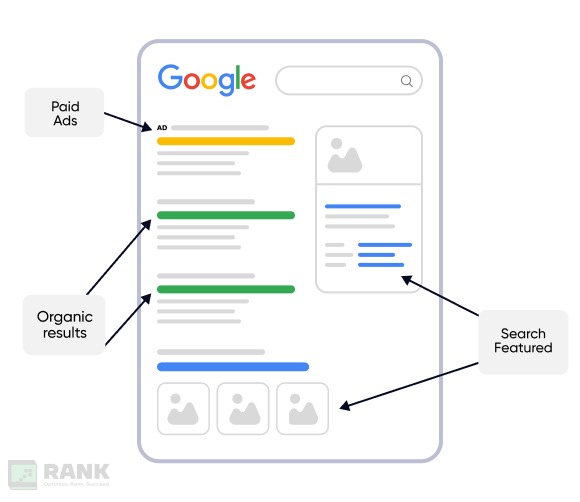What is a SERP? How to read your SEO SERP Report

Your SEO SERP Explained
Search Engine Results Pages (SERPs) are critical to your business here in NZ. Understanding them helps you engage in meaningful discussions about your online performance and the Key Performance Indicators (KPIs) designed to maximise your exposure.
A Google SERP is the page Google shows after someone types in a search query. It usually lists results relevant to the query, but also includes various other SERP features like ads, featured snippets, knowledge panels, images, videos, and news articles. The layout changes depending on the search query, your location (e.g., Auckland vs. Wellington), and the device you’re using. Source: Google Ads Managers who understand CPP and CTR.


S.E.R.P: Search Engine Results Pages Metrics
Here’s a breakdown of the key terms you’ll see in your RANK SEO report:
Keywords
These are the specific terms and phrases we target in your industry. Typically, we focus on keywords known to have high search traffic value, meaning lots of Kiwis are searching for them. Effective keyword research is the foundation of our strategy.
Total Visibility
This metric represents your overall exposure across all major search engines (though we often focus on Google) based on the keywords we are tracking for your campaign.
Rank
This is your website’s position on Google’s results page when someone searches for a specific targeted keyword. Each Google results page typically shows 10 organic listings. So, if your report says rank 91, it means you’re the first result on page 10 (9 pages x 10 results + position 1).
Long-tail Keywords
Long-tail keywords are longer, more specific phrases containing your main keywords. For example, if “renovations” is a main keyword, a long-tail version might be “kitchen renovations specialist Auckland” or “best bathroom renovations Hamilton”. These often indicate users are closer to making a decision.


How Visibility Impacts Your Business
Improving your visibility drives real business results. Think of it like this:
The Formula: More Relevant Visibility → More Traffic → More Leads → More Sales → More Money
- More Relevant Visibility
- Leads to: More Traffic
- Leads to: More Leads
- Leads to: More Sales
- Leads to: More Money
Factors Impacting Visibility
Several things influence your Total Visibility score:
- Keyword Rank Position: The higher your website ranks for targeted keywords, the greater your visibility.
- Number of Keywords Tracked: Logically, if we start tracking more keywords, your overall average visibility percentage might initially decrease until those new keywords start ranking well.

Visibility Broken Down by Search Engine
While we track total visibility, our reports primarily quote your Google visibility, as Google is the dominant search engine in New Zealand. In most cases, your Google visibility score will be higher than the combined total visibility score across all search engines (though the example below shows the opposite).

Understanding Your Ranking Summary
Ranking Summary Breakdown
This section shows how many keywords have moved into different ranking brackets (e.g., Top 10, Top 50) within Google’s top 100 results since the last report. For example, the summary might show ‘2 keywords moved into the top 10 (total 13)’ and ‘2 moved into the top 50 (total 40)’. It also tracks movement into the coveted #1 spot.
The goal is always to move as many keywords as possible into the Top 10 and towards #1.


Total Up and Down
This part clearly shows how many keywords have improved their ranking (moved up) and how many have dropped (moved down) since the previous report. It’s critical to see more keywords moving up than down consistently, month after month.
Individual Keyword Ranks
This section provides a detailed breakdown, keyword by keyword. Sorted alphabetically, you can see:
- Which keywords we are targeting for you.
- Their current position on Google NZ.
- How much their position has changed (movement) since the LAST REPORT.
Every month, RANK often releases blog content designed to support specific keywords targeted for that month. Blogs help strengthen your website’s authority and keyword relevance. Typically, we aim to successfully improve rankings for 1-3 core keywords per month through various activities, highlighting why SEO is a long-term strategy for securing lasting organic ranks.
Why Focus on Organic Ranking?
- Unlike expensive paid ads, such as Google Ads (formerly AdWords), which can cost you big bucks per click, ranking organically gives your business free exposure. The more exposure you gain through organic rankings, the more cost-effective your marketing becomes over time.
- This doesn’t mean paid advertising isn’t necessary. Rather, we often use paid ads to complement our organic strategy, giving you the best of both worlds and maximising your overall marketing investment.

